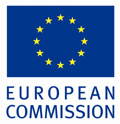
Sample menu:
Events and Conferences
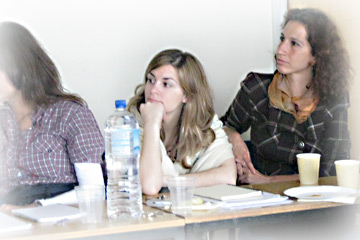 1st Consortium Meeting
1st Consortium Meeting
The first meeting of the PIDOP consortium took place on May 14th-16th 2009 at the University of Surrey, UK. At this meeting, work on WP2, WP3 and WP4 commenced. The WP2 workshop focused on the proposed methods of policy analysis, while the WP3 and WP4 workshops surveyed existing political and psychological theories of civic and political participation.
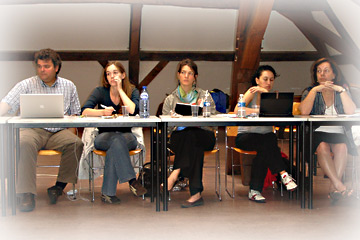 2nd Consortium Meeting
2nd Consortium Meeting
The second meeting of the PIDOP consortium took place on July 22nd-24th 2009 at the University of Liège, Belgium. The WP2 workshop was used to brief teams on the policy analyses to be conducted. The WP5 workshop discussed the modelling of existing survey data, while the WP6 workshop focused on the minority and migrant groups to be studied.
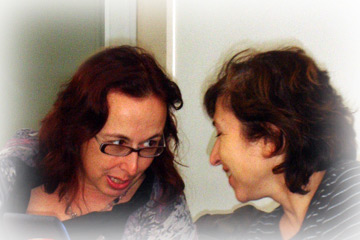 3rd Consortium Meeting
3rd Consortium Meeting
The third consortium meeting took place on November 26th-27th 2009 at the University of Porto, Portugal. There were workshops on policy analysis (WP2), the development of a political theory of participation (WP3), the development of a psychological theory of participation (WP4), the modelling of survey data (WP5), and on the empirical work which is to be conducted to explore the processes which occur in the co-construction of citizenship in different life contexts (WP6).
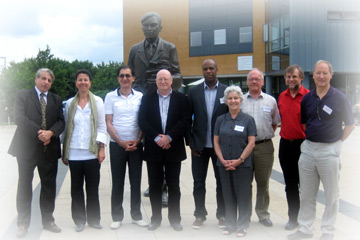 4th Consortium Meeting
4th Consortium Meeting
The fourth meeting of the consortium took place on 1st and 2nd July, 2010, at the University of Surrey, UK. These dates were adjacent to the 2010 Annual Conference of the Centre for Research on Nationalism, Ethnicity and Multiculturalism (CRONEM), 29th-30th June 2010. The conference was devoted to the theme of Civic, Political and Cultural Engagement Among Migrants, Minorities and National Populations: Multidisciplinary Perspectives, and members of the consortium presented some of the initial findings from the PIDOP project at it. For full details of the PIDOP presentations which were made at the conference, and to download some of the presentations, please click on the Conference presentations button on the left of this page.
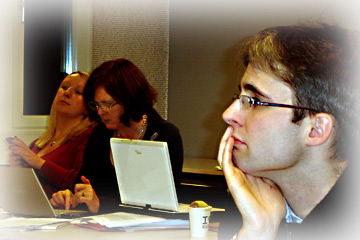 5th Consortium Meeting
5th Consortium Meeting
The fifth consortium meeting took place on November 4th-5th 2010 at Örebro University, Sweden. At the meeting, the consortium was briefed about the outcomes of the policy analysis (WP2) and the outcomes of the focus groups and interviews (WP6). There were also workshops on the development of a political theory of participation (WP3), the development of a psychological theory of participation (WP4), the modelling of survey data (WP5), and on the design of the questionnaire which is to be used in the next phase of WP6 which will be exploring the psychological processes that drive civic and political participation in young people, women, minorities and migrants (WP6).
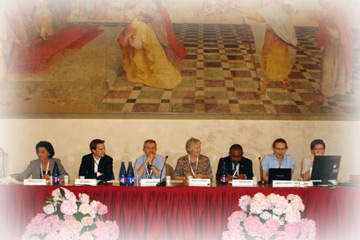 6th Consortium Meeting
6th Consortium Meeting
The sixth meeting of the consortium took place on May 11th-13th, 2011, at the University of Bologna, Italy. On May 11th-12th, an international multidisciplinary conference organised by the PIDOP Consortium in collaboration with the University of Bologna took place. The theme of the conference was Engaged Citizens? Political Participation and Civic Engagement among Youth, Women, Minorities and Migrants, and members of the consortium presented findings from the PIDOP project at the conference. The conference was attended by researchers, academics, policymakers and practitioners from 17 different countries. For further information about the conference, please click on the PIDOP Conference 2011 button on the left of this page. On the 13th May, the conference was followed by a one day meeting for members of the PIDOP consortium.
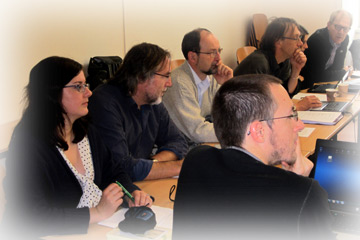 7th Consortium Meeting
7th Consortium Meeting
The seventh meeting of the consortium took place on November 17th-19th 2011, at Masaryk University, Brno, Czech Republic. At the meeting, the consortium was briefed about the outcomes of the modeling of survey data (WP5) and the outcomes of the survey into the psychological processes that drive civic and political participation in young people, women, minorities and migrants (WP6). The two ongoing theoretical work packages which are developing new political and psychological theories of participation (WP3 and WP4, respectively) also reviewed their conclusions in the light of the empirical findings at this meeting. In addition, the final work package, WP7, which is devoted to producing an integrated multi-level explanation of civic and political participation in the light of the findings obtained by WP5 and WP6, commenced its activities at the Brno meeting. WP7 work also commenced on formulating new evidence-based recommendations for policy and practice at local, national and EU levels.
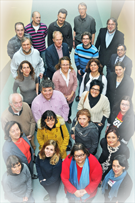 8th Consortium Meeting
8th Consortium Meeting
The eighth meeting of the consortium took place on April 16th-18th 2012, at the University of Surrey, UK. On April 16th-17th, an international multidisciplinary conference organised by the PIDOP Consortium in collaboration with the Centre for Research on Nationalism, Ethnicity and Multiculturalism (CRONEM) took place. The theme of the conference was Political and Civic Participation, and members of the consortium presented findings from the PIDOP project at it. The conference was attended by researchers, academics, policymakers and practitioners from 30 different countries. For further information about the conference, please click on the PIDOP Conference 2012 button on the left of this page. On the 18th April, the conference was followed by a one day meeting for members of the PIDOP consortium. At this meeting, the consortium took stock of the outcomes of the project and planned future dissemination activities.
PIDOP Policymakers Briefing Meeting, Brussels, Belgium
On 24th April 2012, the PIDOP research consortium organised a half-day briefing meeting for policymakers at the European Commission in Brussels. The meeting was attended by members of the European Commission (DG Research and Innovation; DG Education and Culture, Youth Policy; DG Home Affairs, Immigration and Integration; DG Communication, EC Citizenship Programme), the Council of Europe (Directorate of Democratic Citizenship and Participation), Active Citizenship Foundation, European Network against Racism, European Youth Forum, and the Organising Bureau of European School Student Organisations (OBESSU), amongst other organisations. The purpose of the meeting was to report and receive feedback on the evidence-based policy recommendations which have emerged from the PIDOP project.
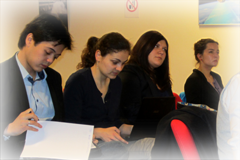 |
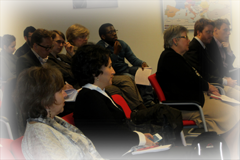 |
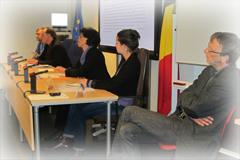 |
